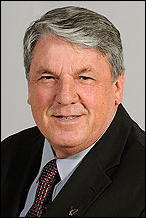 David Walker (D-Clay)
David Walker (D-Clay)
House of Delegates
WV Legislature-District 33
As we enter into the New Year we all count our blessings. As such, I would like to share in the celebration of our state's fiscal stability and provide you with insight into some of the workings and future proposals before the state legislature in 2011.
West Virginia entered December with its general revenue budget $121 million in the black while nearly a dozen other states face deficit threats totaling $10 billion. According to figures from the National Governors Association and the National Association of State Budget Officers which recently released their latest fiscal survey of states. That report also suggests West Virginia is well-positioned to balance the upcoming budget that the Legislature must craft early next year.
November state tax collections brought in $278 million, or $26 million more than expected. Marking the seventh straight month for better-than-projected revenues, West Virginia is 8.2 percent ahead of its forecast for the budget year.
The new report found other states still struggling in the Great Recession's wake. Fourteen states have already cut $4 billion from current spending to avoid deficits. They include one of West Virginia's five neighbors, Pennsylvania. While states overall have seen revenues rise, the survey found 11 facing a combined $10 billion in budget gaps.
West Virginia may avoid tough choices as tax hikes, program cuts and public worker layoffs. The survey ranked it second nationally, behind only Alaska, for the size of its revenue balance when compared to its spending.
With West Virginia's reserves at $631 million, the survey estimates the state still has unspent surplus it could devote to its upcoming budget. Key revenue sources, personal income and sales and use taxes, beat their monthly targets by a combined $16.7 million and business franchise and corporate net income taxes, brought in $1.5 million though only $200,000 was expected. Severance taxes on coal and other extracted natural resources have been crucial over the past two years in buoying general revenues. Those taxes totaled $47.7 million, $7.9 million or 20 percent above their projection.
Maintaining and stabilizing our state budget is the number one priority for the Legislature and I am pleased to see our state is continuing to remain afloat during these troubled fiscal times.
West Virginia is also creating a workforce. During a variety of education meetings, discussions were conducted considering looking at vocational classes being provided at schools instead of going to technical centers. The future of our state lies in technology and public schools, technical colleges and higher institutions are looking at ways to train for application.
Also West Virginia Workforce continues to train and assist adults who have been misplaced in the workforce. Money has been allocated to training centers throughout the state to redirect careers of many individuals.
With economic development and job creation in the forefront of his state priorities, West Virginia is proceeding to conduct a comprehensive study to analyze an action plan regarding the tourism industry. The economic impact from direct tourism spending in West Virginia totaled $4.38 billion in 2008. Travel spending directly supports 44,000 jobs and millions of travel-related dollars are generated annually in every West Virginia county (from $1.3 million in the year 2000 to $729.3 million last year). Tourism generated 14 million overnight visitors and 40 million day-trip visitors in 2008. And, West Virginia's landscape, culture and history present tourism development opportunity in every county.
West Virginia's fiscal stability - with a good bond rating, apparently solid budget and level or declining business tax rates - are all of what we expect to have to attract industry.
With our state's economy on the mend, we all have to consider changes which may affect that scenario but the changes, if not met, will affect our children's future.
Many states fall short of having adequate funding for the future benefits promised for pension and retiree health care. With our Other Post Employment Benefits (OPEB) obligation of $8 billion, lawmakers are reviewing a variety of concepts to curb the debt down or that liability will rise to $15 billion in 2015.
The federal Affordable Care Act changes how large segments of the American health system will work. We have been pioneering most of the provisions of the 900 page bill.
About 200,000 of West Virginia's 385,000 children are insured through CHIP or Medicaid. The federal government pays 81 percent of the cost of CHIP. The Legislature also is continuing to work with a variety of health care professionals to expand and enhance community health centers to keep health care close to home. Too, long-term care for our seniors is being analyzed for further assistance for our most frail citizens.
In the new year, lawmakers will be looking at a variety of significant issues, often upon the direction of the federal government and all with federal funding incentives.
If you should have any questions or comments regarding any issues or bills before the Legislature, please feel free to contact me. To write me, my address is Delegate David Walker, State Capitol, Building 1, Room 230-E, Charleston, WV 25305 or call me at (304) 340-3135. I encourage all my constituents to remain active and become part of the legislative process.
| 


